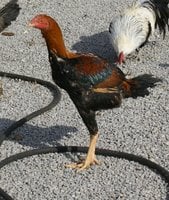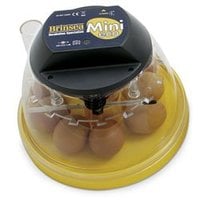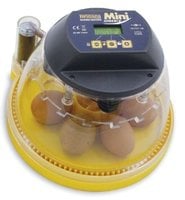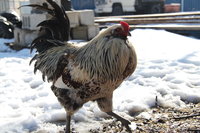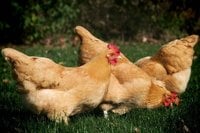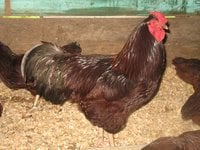I have been searching for Malay for about half a decade now and finally got my first pair. They are more wonderful than I could have imagined. Their size and sturdiness is awe inspiring; they are the most unusual and yet majestic fowls I have come across. If not handled they may be rather flighty, however after handling my pair they have begun to tame down nicely. They can be a little hard to handle if you don't know how to properly hold and move a bird of this size. They do eat tons, and are very picky eaters. I do not see them being useful producers of either eggs or meat at any point. They also require a lot of space. However, if you have the time, space, money, and of course interest in the breed, they can be very rewarding to keep.

Navigation
Install the app
How to install the app on iOS
Follow along with the video below to see how to install our site as a web app on your home screen.
Note: This feature may not be available in some browsers.
More options
You are using an out of date browser. It may not display this or other websites correctly.
You should upgrade or use an alternative browser.
You should upgrade or use an alternative browser.
Reviews by QueenMisha
Filters
Show only:
Loading…
- QueenMisha
- 5.00 star(s)
Pros: Unusual; good tempered; excellent as pets and show birds
Cons: Harder to handle due to size; hard to find; eat a lot
- Purchase Price
- 120.00
- Purchase Date
- 2017-02-03
- QueenMisha
- 4.00 star(s)
Pros: Good hatch rates; easy to set up; good design; simple; good price
Cons: Not as automated
Mini Ecos are a great choice for those who want a quality small incubator but don't want to break the bank. Although you will have to turn the eggs yourself and the temperature readout is not digital but rather an actual thermometer, this incubator will give the same excellent hatch rates of a Mini Advance for quite a bit cheaper. It shares the same simple design, good visibility, and sturdy construction that has made the Mini Advance such a good incubator.
- Purchase Date
- 2016-06-22
- QueenMisha
- 5.00 star(s)
Pros: Great hatch rates; easy to set up; good design; accurate; simple
Cons: None!
A Brinsea Mini was my first incubator and it will be my last too. It is a high quality small incubator for the backyard hobbyist; no, you can't hatch a ton of chicks out of it, but it's ideal for folks who just want to keep small flock numbers up or have some fun with hatching eggs! Temperature control and turning modes are totally digital. Humidity is not, however I have found keeping the humidity up in a Mini simpler than trying to calibrate it in an incubator with automatic humidity - simply fill one of the wells up every couple days. The incubator is made of a tough and durable plastic, and makes it very easy to view the eggs as they hatch! It is easy to clean as well.
I have only ever had one issue with this incubator - after about 5 years of use, the transformer cord wore out. I ordered a new one for about $15 from Brinsea and now my baby's up and running again. Other than that, it has been perfect from the day I got it.
I have only ever had one issue with this incubator - after about 5 years of use, the transformer cord wore out. I ordered a new one for about $15 from Brinsea and now my baby's up and running again. Other than that, it has been perfect from the day I got it.
- Purchase Date
- 2011-12-25
- QueenMisha
- 4.00 star(s)
Pros: Good layers, beautiful eggs, veritable rainbow of plumage colors
Cons: Can be flighty, harder to sex, not a real breed
Easter Eggers are among my favorite birds. I have at least twenty in my flock and have had many more in the past. They are beautiful and hardy birds, and the majority will produce a very beautiful blue or green egg. I've found about 5-10% will produce a tan or tinted egg instead. They make a truly wonderful addition to any backyard flock, and I would certainly recommend them. They do have a few downsides however; a notable one is their recent tendency toward flightiness. Since they are more of a type and not a true breed, they have always been variable in personality, running the gamut from lap chickens to downright unhandleable. However, in recent years they have ranged more and more on the skittish side. Not to say that they can't be tamed or you won't find a calm one, but more than half of the ones I have encountered the past three years have been quite shy. Additionally, they are harder to sex than other breeds. I can't say why, but I can say that in the batches of three or four hundred sexed pullets of various breeds I see go through my workplace every month, we always end up with four or five Easter Egger "oopsters" and yet only one or two cockerels of other breeds. They also take longer to sex accurately and are really one of the only breeds that can fool me these days. And lastly, they are a not a purebred and so are not a good choice for those interested in exhibiting their birds, but this isn't relavent to most backyard keepers.
Overall, I would recommend them to the backyard keeper, provided you are OK with a bird who may require extra handling to be so friendly as most other breeds, and have considered your options should you end up with an "oopster."




Overall, I would recommend them to the backyard keeper, provided you are OK with a bird who may require extra handling to be so friendly as most other breeds, and have considered your options should you end up with an "oopster."
- Purchase Date
- 2012-10-01
- QueenMisha
- 5.00 star(s)
Pros: Docile, cocks are nice, hens lay well, cockerels make fine meat fowl
Cons: Not the greatest for hot climates, can get overheated
Orpingtons are my second favorite breed besides Shamo. They are, in my mind, the #1 dual purpose fowl in the world. My hens lay very well, and my flock leader is a Jubilee Orpington cock, who produces massive and strong chicks. Even his crossbred offspring turn into great layers and heavy meat fowls. They all have lovely temperaments. Both breeder quality and hatchery quality birds of this breed make excellent birds for both the backyard and large flocks. Though avoid hatchery quality specimens for meat uses; breeder quality are more suited for producing meat fowl, since the hatchery form has been bred down severely. I also love the massive array of varieties available from breeders - everything from Jubille to Crele, Mottled to Blue, Lavender to Isabelle Cuckoo. The English forms are certainly nothing short of stunning. I would recommend this breed to anyone looking for a laying hen, a flock rooster, a meat and egg producer, a show fowl, or a good pet.
- QueenMisha
- 3.00 star(s)
Pros: Good layers, easily obtainable
Cons: Bad choice for mixed flocks, can be very nasty to other birds
Note: This review applies to to the Production Red form of Rhode Islands only. True Rhode Islands are lovely birds, and while their production is not as high, their color and good attitude make up for it.
I am not personally fond of Rhode Island Reds. If I was basing this review on my own opinion, I would be giving them 1 star. However, objecitively, they are an OK bird, and so receive 3.
To start, they are severely overrated. As someone employed in the business of selling started pullets, I deal with many customers each week asking about Rhode Island Reds. They have always "read somewhere" that they are the best layers in the world! This isn't true. A Rhode Island is only a good layer. Now, I personally rate bird's laying ability on a scale of great, good, and ornamental. Great layers will give you 5-6 eggs per week. Good layers, 4-5. Ornamentals will vary but will never produce like a proper laying breed. Now, being as Rhode Island Reds are only good layers, a bird such as a Sex Link or Leghorn (great layers) will outlay them any day of the week. Yet people consistently spread these ideas that RIRs are the best layers in the world.
The second issue is temperament. Now, I'm not completely slandering the breed. There are plenty of perfectly nice Rhode Islands out there, birds who've never pecked a single other hen or human. But on the whole, the breed has a tendency towards nastiness. Now, I work with hundreds of birds at a time in my workplace. These pullets are raised together, and so as happens with hundreds of birds raised in close proximity, you get a bit of picking - a tailless bird here, a bare-necked hen there, nothing so severe as to see horribly bald birds or wounds or anything of the sort. And yet, when a group of birds is raised with Rhode Islands tossed in the mix, suddenly every bird is tailless, and you've got scabby backs and irritated, red oil glands. Same amount of space, same yard to roam, same number of birds, but invariably, groups with RIRs mixed in get picked out far worse than any other groups.
Conclusion: A good layer, but don't expect the 365 egg a year bird some people like to crow about. Be wary of purchasing more than 2-3 of them, at most, if you keep a mixed breed flock. They do awful in confinement and will pick each other out to the point of wounding. As far as the Production Red category goes, I'd call them my third choice of bird. Red Sex Links are better layers, and New Hampshires have a far better temperament.
I am not personally fond of Rhode Island Reds. If I was basing this review on my own opinion, I would be giving them 1 star. However, objecitively, they are an OK bird, and so receive 3.
To start, they are severely overrated. As someone employed in the business of selling started pullets, I deal with many customers each week asking about Rhode Island Reds. They have always "read somewhere" that they are the best layers in the world! This isn't true. A Rhode Island is only a good layer. Now, I personally rate bird's laying ability on a scale of great, good, and ornamental. Great layers will give you 5-6 eggs per week. Good layers, 4-5. Ornamentals will vary but will never produce like a proper laying breed. Now, being as Rhode Island Reds are only good layers, a bird such as a Sex Link or Leghorn (great layers) will outlay them any day of the week. Yet people consistently spread these ideas that RIRs are the best layers in the world.
The second issue is temperament. Now, I'm not completely slandering the breed. There are plenty of perfectly nice Rhode Islands out there, birds who've never pecked a single other hen or human. But on the whole, the breed has a tendency towards nastiness. Now, I work with hundreds of birds at a time in my workplace. These pullets are raised together, and so as happens with hundreds of birds raised in close proximity, you get a bit of picking - a tailless bird here, a bare-necked hen there, nothing so severe as to see horribly bald birds or wounds or anything of the sort. And yet, when a group of birds is raised with Rhode Islands tossed in the mix, suddenly every bird is tailless, and you've got scabby backs and irritated, red oil glands. Same amount of space, same yard to roam, same number of birds, but invariably, groups with RIRs mixed in get picked out far worse than any other groups.
Conclusion: A good layer, but don't expect the 365 egg a year bird some people like to crow about. Be wary of purchasing more than 2-3 of them, at most, if you keep a mixed breed flock. They do awful in confinement and will pick each other out to the point of wounding. As far as the Production Red category goes, I'd call them my third choice of bird. Red Sex Links are better layers, and New Hampshires have a far better temperament.

